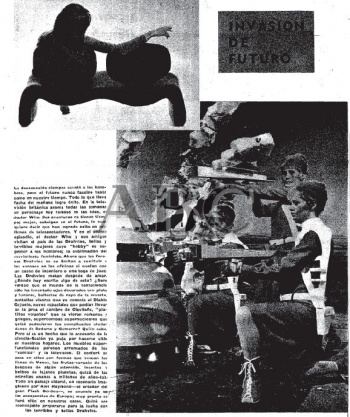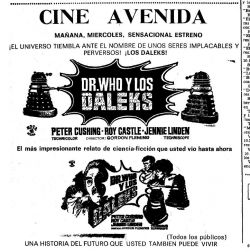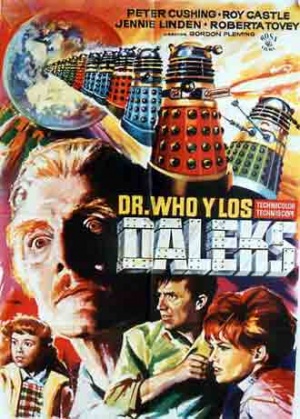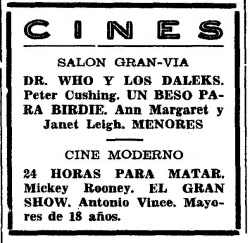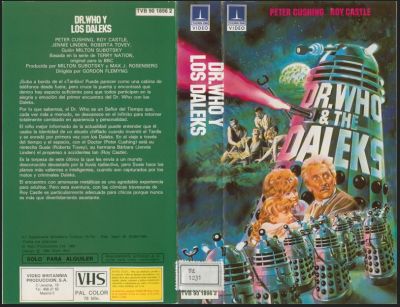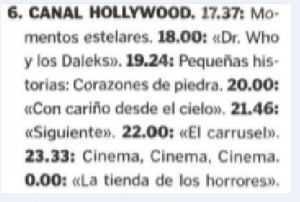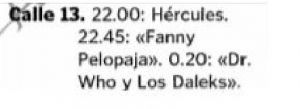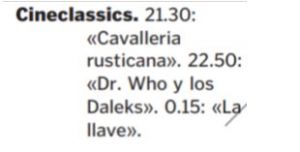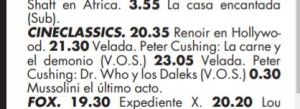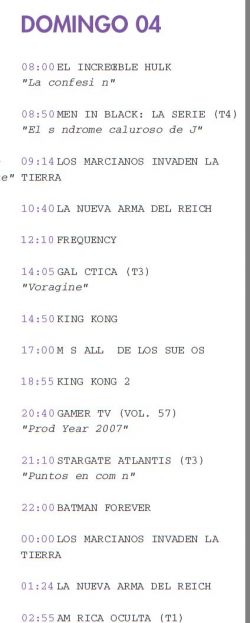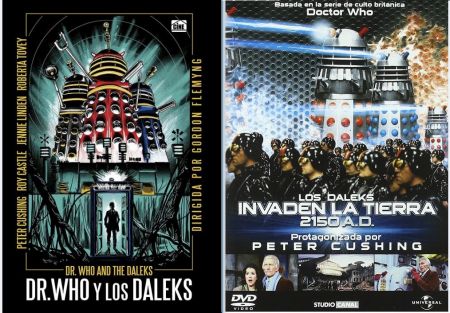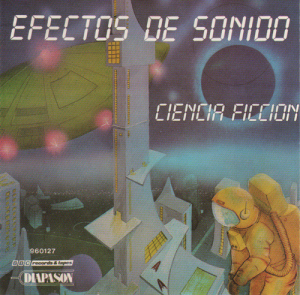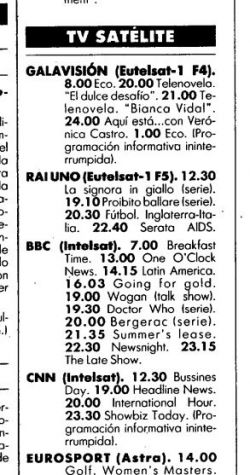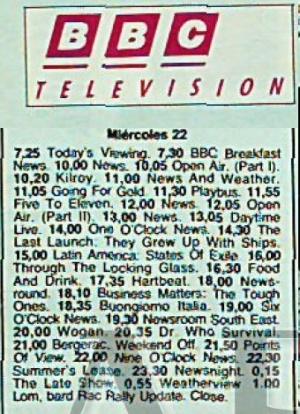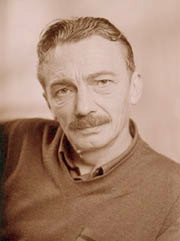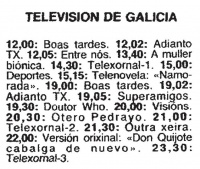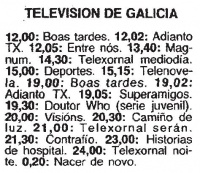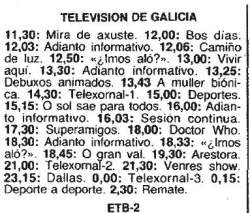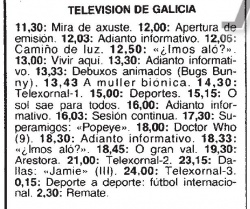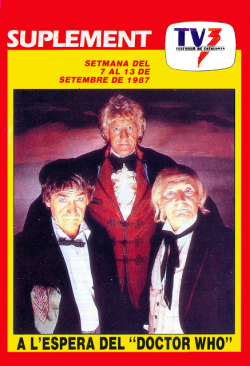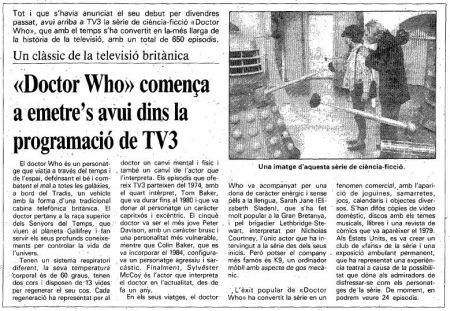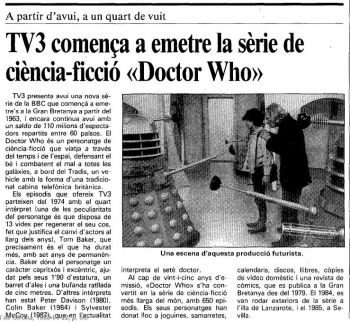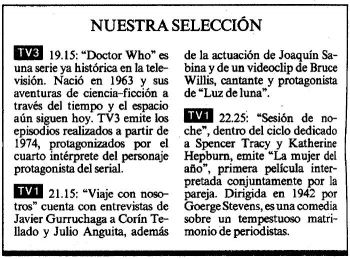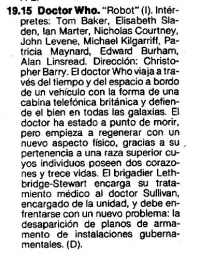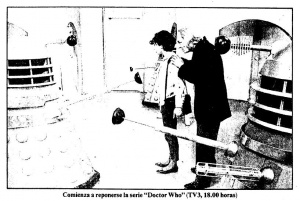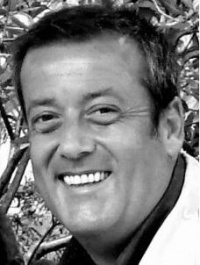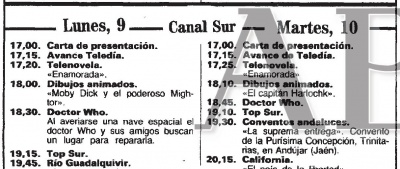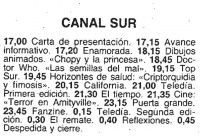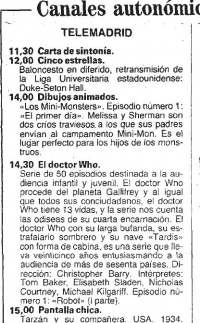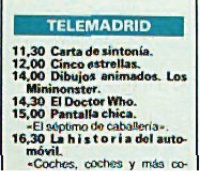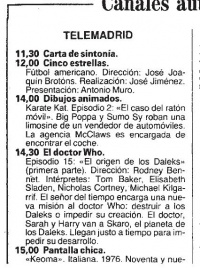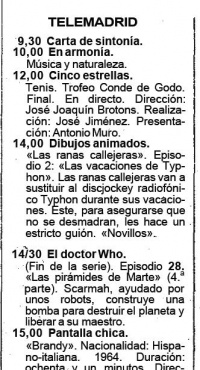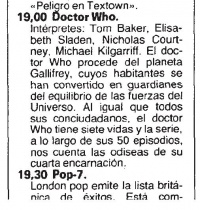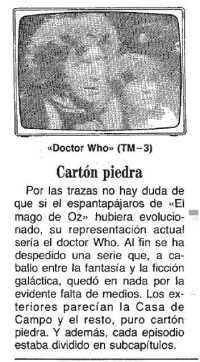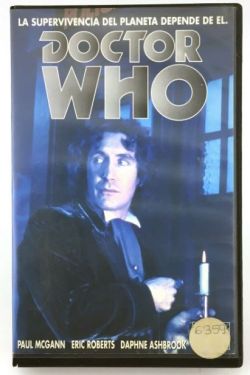Difference between revisions of "Spain"
Jon Preddle (talk | contribs) |
Jon Preddle (talk | contribs) |
||
| (26 intermediate revisions by the same user not shown) | |||
| Line 24: | Line 24: | ||
PAL colour broadcasts commenced in 1972. | PAL colour broadcasts commenced in 1972. | ||
| − | By the late 1990s and early 2000s, a number of cable and satellite stations had been established. | + | By the late '''1990s''' and early '''2000s''', a number of cable and satellite stations had been established. |
| + | |||
| + | The [[Germany|German]] satellite station '''RTL''' (which aired '''Doctor Who''' from '''1989''') was also available in parts of Spain. | ||
| Line 43: | Line 45: | ||
===[[Peter Cushing|PETER CUSHING]] and the Daleks=== | ===[[Peter Cushing|PETER CUSHING]] and the Daleks=== | ||
{{image table | {{image table | ||
| − | |[[File:Y Los Daleks.jpg|thumb| | + | |[[File:DaleksCanaryIs1966.JPG|250px|thumb|right|The film was seen on the Grand Canary Island, from 28 December 1966; El Eco da Canarias; 27 December 1966]]| [[File:Y Los Daleks.jpg|thumb|300px|Poster for the first movie's release in Spain in 1967 (painted by Macario 'Mac' Gomez]]|[[File:SpainDWAD.JPG|250px|thumb|Generic newspaper listing for the first film]] |
}} | }} | ||
| Line 49: | Line 51: | ||
[[File:DWYLD1967.JPG|thumb|right|450px|Dr Who y los Daleks - starts today! ABC, 7 January 1967]] | [[File:DWYLD1967.JPG|thumb|right|450px|Dr Who y los Daleks - starts today! ABC, 7 January 1967]] | ||
| − | The first of the two Dalek movies screened in Spain | + | The first of the two Dalek movies screened in Spain and its island territories under the title '''"Dr Who y los Daleks"'''. It was distributed by Rosa Films, and as far as we can tell, the film was dubbed. |
| − | The film | + | The film appears to have had its Spanish '''premiere''' in Palma on the Balearic island of Mallorca in the Mediterranean; it makes its first appearance in the [https://hemerotecadigital.bne.es/hd/es/results?o=&w=%22los+daleks%22+&f=text&o=o&w=&f=text&o=n&w=&f=text&o=&w=&f=text&o=o&w=&f=text&o=n&w=&f=text&p=0%7E0&g=p&d=date&d=&d=&l=10&t=date-asc&g=e&upload= ''Diario de Mallorca'' issue dated '''30 September 1966''']. The paper itself is not available for viewing online, so we can't determine if this is a mid-run listing, a "starting today" ad, or a "starts tomorrow" style promotion. |
| + | |||
| + | The final listing for the film in that paper is in the '''9 October 1966''' issue. Again, it’s not known if this was the final day of exhibition, or it's merely the last appearance because not all the issues of the paper are archived. | ||
| + | |||
| + | The next known Spanish listings for the film are in the [[Canary Islands]]. One such screening was at the Cine Avenida in Las Palmas on the Grand Canary Island – starting from Wednesday, '''28 December 1966'''. The film ran in Las Palmas until at least '''5 January 1967''', as that is the last listing in the archived issues of ''Diario de Las Palmas''. | ||
| + | |||
| + | It wasn't until the new year that the film reached mainland Spain. It's first showing was at the El Apolo theatre in Madrid on '''7 January 1967'''. A review appeared in the '''8 January 1967''' edition of the ''ABC'': | ||
*[https://cuttingsarchive.org/index.php/Estreno_de_la_pelicula_%22Doctor_Who_y_los_Daleks%22,_en_el_Apolo#tab=Description Review dated 8 January 1967] | *[https://cuttingsarchive.org/index.php/Estreno_de_la_pelicula_%22Doctor_Who_y_los_Daleks%22,_en_el_Apolo#tab=Description Review dated 8 January 1967] | ||
| Line 75: | Line 83: | ||
| − | The film then appeared in other | + | The film then appeared in other cities around the country, and continued to play from time to time over the next few years in small regional theatres. |
| + | *[https://hemerotecadigital.bne.es/hd/es/results?o=&o=o&o=n&o=&o=o&o=n&w=%22los+daleks%22+&w=&w=&w=&w=&w=&f=text&f=text&f=text&f=text&f=text&f=text&p=0~0&g=p&g=e&d=date&d=&d=&l=10&t=date-asc&upload=&s=10 Listings for "Daleks" in Hemeroteca Digital archive 1966 onwards] | ||
| − | + | The second film was never shown at cinemas in Spain during the 1960s and 1970s. (We accessed several late 1960s / early 70s Spanish newspapers and found no sign of the movie; there is certainly no sign of it in the Hemeroteca Digital archive linked above.) | |
| − | English prints of both films were | + | In '''August 1970''', some theatres screened the first movie in a double-bill with '''King Kong Escapes''' (''King Kong se Escapa''); the chief villain in this Japanese-America co-production is called "Dr Who" -- see our [[Japan]] page for more. |
| + | |||
| + | English prints of both films were later shown at the Pequeño Cine Estudio during the annual Festival Internacional de Cine Imaginario y de Ciencia Ficción de Madrid on '''15 March 1981'''. | ||
'''VHS TAPE''' | '''VHS TAPE''' | ||
| + | [[File:SpainDWATD.JPG|right|thumb|400px|Cover slick of the VHS tape released in Spain]] | ||
| − | The first film was released on VHS by Video Britannia Producción SA in '''1984'''. This | + | The first film was released on VHS by Video Britannia Producción SA Madrid in '''1984'''. This "Solo Para Alquiler" ("For Rental Only") tape had a different dub to that used on the original cinema release. The new actor providing the voice for "Dr Who" was Joaquin Escola. |
| − | + | The cover displays Tom Chantrell's original painting that adorned the English tape. Since the English title is part of the actual artwork, and therefore not easy to cover over or replace with a foreign translation, the Spanish title appears only on the spine and back cover. | |
* [http://www.eldoblaje.com/datos/FichaPelicula.asp?id=22090 SPANISH VOICES for DR WHO AND THE DALEKS] | * [http://www.eldoblaje.com/datos/FichaPelicula.asp?id=22090 SPANISH VOICES for DR WHO AND THE DALEKS] | ||
Note: Actor Salvador Aldeguer provided a "Dalek" voice – he had previously dubbed for Tom Baker for the 1980s screenings of the television series (See below). | Note: Actor Salvador Aldeguer provided a "Dalek" voice – he had previously dubbed for Tom Baker for the 1980s screenings of the television series (See below). | ||
| − | |||
| + | The second film was released on dubbed VHS by Ízaro Films in '''January 1990''' (per the note at the bottom of [https://www.eldoblaje.com/datos/FichaPelicula.asp?id=19818 this dubbing site] and the entry on [https://sede.mcu.gob.es/CatalogoICAA/Peliculas/Detalle?Pelicula=3485440 the ICAA site]) but we have not been able to track down an image of the VHS cover. | ||
| + | {{clear}} | ||
'''ON TELEVISION''' | '''ON TELEVISION''' | ||
| − | [[File:DWYLDCanalHW.JPG|right|thumb|350|Canal Hollywood screening, | + | [[File:DWYLDCanalHW.JPG|right|thumb|350|Canal Hollywood screening, 26 June 2000; the ''other'' Cushing Dalek film was instead shown on the Portuguese feed!]] |
[[File:DWYLDCalle13.JPG|right|thumb|300px|Calle 13 screening, 22 November 2000]] | [[File:DWYLDCalle13.JPG|right|thumb|300px|Calle 13 screening, 22 November 2000]] | ||
[[File:SpainCineClassics2002.JPG|right|thumb|350|Cineclassics screening, March 2002]] | [[File:SpainCineClassics2002.JPG|right|thumb|350|Cineclassics screening, March 2002]] | ||
| + | [[File:SpainCineClassics.JPG|right|thumb|350|Cineclassics screening with "VOS" in listings, 21 August 2002]] | ||
[[File:MarcianosSpain2007.JPG|right|thumb|250px|Listings for the second Dalek movie on 4 and 5 November 2007 (at 9.14am and midnight), from the monthly Sci-Fi Spain magazine]] | [[File:MarcianosSpain2007.JPG|right|thumb|250px|Listings for the second Dalek movie on 4 and 5 November 2007 (at 9.14am and midnight), from the monthly Sci-Fi Spain magazine]] | ||
| − | Apparently it wasn't until the | + | '''"DR WHO Y LOS DALEKS"''' |
| + | |||
| + | Apparently it wasn't until the late 1990s that '''"Dr Who y los Daleks"''' made its way onto television in Spain. | ||
| + | |||
| + | We have so far traced the following screenings - there may have been more (and earlier ones?) on other regional channels. | ||
| + | |||
| + | The film was shown by pay television station '''[https://es.wikipedia.org/wiki/Canal_AluCine Canal Alucine]''' (launched in 1997) on '''16 March 1998''' at 10.15pm. | ||
| + | |||
| + | The film was dubbed, but it's unclear if the 1960s cinema or 1980s VHS dub would be copyrighted and available for later TV broadcasts. Lumiere Pictures, who were the rights owners at this time, may have commissioned a fresh set of recordings for TV -- but see the note below about "VOS"… | ||
| − | + | A few months later, on '''2 August 1998''', the film appeared on digital satellite station '''Cine Tívoli'''; it aired at 7.40pm. | |
| − | + | Two years later, the film was aired by '''[https://es.wikipedia.org/wiki/Canal_Hollywood Canal Hollywood]''' - a pay cable and satellite station launched in 1993 that was available in Spain and [[Portugal]]. | |
| − | When this channel was launched, there was | + | When this channel was launched, there was a separate feed to each country but synchronised with the same schedule, meaning that viewers in Spain saw a dubbed film, while in [[Portugal]] they saw the same film, but in English with subtitles! |
| − | + | However, in the case of the Dalek movies, the two channels aired different films, likely because there wasn't a Portuguese subtitled edition of the first movie - so on '''18 April 2000''' and '''26 June 2000''', when Hollywood Spain showed '''"Dr Who y los Daleks"''' (dubbed), Hollywood Portugal instead had '''"A Invasão da Terra"''' (subtitled)! (See our [[Portugal]] profile page for the newspaper clippings showing the different billings.) | |
| − | The first film was | + | The first film was also shown on Canal Hollywood on '''6 July 2000''', '''17 July 2000''', '''6 August 2000''' and '''20 August 2000'''. |
| + | |||
| + | (Today, the two Canal Hollywood channels play their own separate non-synched schedules.) | ||
| + | |||
| + | <!--{{YouTube table| iaEFDqBv2zY|Generic Canal Hollywood promos from 2000 - Dr Who not included}}--> | ||
| + | The first film was then screened by '''[[Wikipedia:Calle 13 (TV channel)|Calle 13]]''' (launched in 1999) on '''13 November 2000'''. It screened again on '''22 November''' (and possibly a few more times after this). | ||
*[https://ok.ru/video/2394167184018 Dr Who y los Daleks on Calle 13] | *[https://ok.ru/video/2394167184018 Dr Who y los Daleks on Calle 13] | ||
| Line 115: | Line 142: | ||
'''"Dr Who y los Daleks"''' was shown twice - '''1 March''' (at 10.50pm) and '''2 March 2002''' (time unknown) - on '''[[Wikipedia:Cineclassics|Cineclassics]]''', a Spanish pay satellite channel specialising in classic films, which commenced in 1994 but after only nine year ceased operating on 30 June 2003. | '''"Dr Who y los Daleks"''' was shown twice - '''1 March''' (at 10.50pm) and '''2 March 2002''' (time unknown) - on '''[[Wikipedia:Cineclassics|Cineclassics]]''', a Spanish pay satellite channel specialising in classic films, which commenced in 1994 but after only nine year ceased operating on 30 June 2003. | ||
| − | + | '''Cineclassics''' aired it again at 11.05pm on '''21 August 2002'''. | |
| − | + | Since some of the newspaper listings for the '''Cineclassics''' screenings state they were '''"(V.O.S.)"''' - which stands for "Versión Original Subtitulada" (Original Subtitled Version) - we can assume that this station only ever aired an English audio / Spanish subtitled edition while all the other channels noted here aired the dubbed version. | |
| − | The newly-dubbed film was given the title '''"Los Marcianos Invaden la Tierra"''' (''The Martians Invade Earth''); this is spoken by a narrator as the English credits play. | + | In June 2006, most of '''Calle 13''''s science fiction content was moved to the new '''[[Wikipedia:Syfy (Spanish TV channel)|Sci-Fi Channel Spain]]''', launched from on 1 June 2006; '''"Dr Who y los Daleks"''' was shown for the first time on the SF station on Saturday, '''20 October 2007''' at 11.55am, with a repeat at 11.20pm. |
| + | |||
| + | More recently, '''"Dr Who y los Daleks"''' has been aired on '''Andalucia TV''' (owned by Canal Sur – see below) on '''10 October 2019''' at 10.45pm and again on '''29 January 2021''' at 11pm. | ||
| + | |||
| + | The first film can currently be viewed online (in English with Spanish subtitles) at '''[https://www.filmin.es/pelicula/dr-who-y-los-daleks FILMIN]''' | ||
| + | |||
| + | |||
| + | |||
| + | '''"LOS MARCIANOS INVADEN LA TIERRA"''' | ||
| + | |||
| + | The sequel appears to have made its Spanish '''TV debut''' on '''Calle 13''' in '''1999''', according to [https://www.eldoblaje.com/datos/FichaPelicula.asp?id=19818 this Spanish dubbing website], however we have not been able to find any firm listings for that year. | ||
| + | |||
| + | The newly-dubbed film was given the title '''"Los Marcianos Invaden la Tierra"''' (''The Martians Invade Earth''); this is spoken by a narrator as the English text credits play. | ||
The actor providing the voice for "Dr Who" was Claudi Garcia: | The actor providing the voice for "Dr Who" was Claudi Garcia: | ||
* [http://www.eldoblaje.com/datos/FichaPelicula.asp?id=19818 SPANISH VOICES for DALEK INVASION EARTH] | * [http://www.eldoblaje.com/datos/FichaPelicula.asp?id=19818 SPANISH VOICES for DALEK INVASION EARTH] | ||
| + | |||
| + | The film was shown several times by '''Calle 13''' between 1999 and 2002, such as on '''24 June 2001''', at 11pm, the following day '''25 June 2001''' at 4.30pm, and on '''8 July 2001''', at 3pm. It was also shown on '''2 May 2002''' at 12.15am. | ||
| + | |||
| + | Two weeks after it had played the first film (see above), '''Sci-Fi Channel''' screened the second movie on Sunday, '''4 November 2007''' at 9.14am. It was repeated less than 14 hours later, from midnight into Monday, '''5 November''' [see clipping showing both screenings]. | ||
Both films then made semi-regular appearances on the Sci-Fi station (at least twice a month, usually in the very early hours of the morning) through until '''late 2008'''. | Both films then made semi-regular appearances on the Sci-Fi station (at least twice a month, usually in the very early hours of the morning) through until '''late 2008'''. | ||
| Line 130: | Line 173: | ||
*[https://twidw.doctorwhonews.net/channels.php?code=21&pglist=pcm&detail=broadcast Cushing on Sci-Fi Spain (This Week in DW)] | *[https://twidw.doctorwhonews.net/channels.php?code=21&pglist=pcm&detail=broadcast Cushing on Sci-Fi Spain (This Week in DW)] | ||
| − | + | In the late 2010s, both films were available on '''[[Wikipedia:Movistar Plus+|Movistar Plus+]]''', a subscription platform based in Andorra. The second film was added to the service on '''9 December 2018''', while the first wasn't added until '''15 February 2019'''. | |
| + | |||
| + | |||
'''DVD RELEASES''' | '''DVD RELEASES''' | ||
| − | A year after its final TV showing, StudioCanal / Universal released a widescreen DVD of the second film on '''18 March 2009'''. It had two soundtracks - English and Spanish ( | + | A year after its final TV showing, StudioCanal / Universal Pictures Iberia S. L. released a widescreen DVD of the second film on '''18 March 2009'''. It had two soundtracks - English and Spanish (with the Garcia TV dub), plus Spanish and [[Portugal|Portuguese]] subtitles. |
Although the film itself was still entitled '''"Los Marcianos Invaden la Tierra"''' per the voice-over at the start, the outer box cover and packaging gave the alternative title of '''"Los Daleks Invaden la Tierra 2150 AD"'''; this was no doubt a deliberate move to cash in on the popularity of the [[New Series]] - indeed, the front and back of the DVD box had direct references to the cult BBC TV series - '''"Basada en la serie de culto británica Doctor Who"'''. | Although the film itself was still entitled '''"Los Marcianos Invaden la Tierra"''' per the voice-over at the start, the outer box cover and packaging gave the alternative title of '''"Los Daleks Invaden la Tierra 2150 AD"'''; this was no doubt a deliberate move to cash in on the popularity of the [[New Series]] - indeed, the front and back of the DVD box had direct references to the cult BBC TV series - '''"Basada en la serie de culto británica Doctor Who"'''. | ||
| Line 141: | Line 186: | ||
(Like many of the early DVD releases, this has the pre-credit sequence repositioned and appearing ''after'' the opening titles.) | (Like many of the early DVD releases, this has the pre-credit sequence repositioned and appearing ''after'' the opening titles.) | ||
| − | In '''July 2015''', '''La Casa del Cine Para Todos''' released the first film on DVD, with English and Spanish soundtracks | + | In '''July 2015''', '''La Casa del Cine Para Todos''' released the first film on DVD, with English and Spanish soundtracks plus Spanish subtitles. |
[[File:SpainDaleksDVD.JPG|thumb|left|450px|Spanish DVDs: the second film was given an alternative title on the packing only; the film itself retained its original Spanish title]] | [[File:SpainDaleksDVD.JPG|thumb|left|450px|Spanish DVDs: the second film was given an alternative title on the packing only; the film itself retained its original Spanish title]] | ||
{{clear}} | {{clear}} | ||
| + | |||
| + | Information about the films can be found on the website of the Instituto de la Cinematografía y de las Artes Audiovisuales (I.C.A.A.): | ||
| + | |||
| + | *[https://sede.mcu.gob.es/CatalogoICAA/Peliculas/Detalle?Pelicula=695650 Dr Who y Los Daleks] | ||
| + | *[https://sede.mcu.gob.es/CatalogoICAA/Peliculas/Detalle?Pelicula=3485440 Daleks Invasion] | ||
| + | |||
| + | (Note: the second film is recorded only under the title '''"Los Daleks Invaden la Tierra"''', which is that of the 2009 DVD title - albeit without the "2150 AD" date; the ICAA site merely records its 'current' title, and none of its other earlier known variants, such as '''"Los Marcianos Invaden la Tierra"'''.) | ||
| Line 160: | Line 212: | ||
[[File:BBC SFX 1.png|right|thumb|300px|The BBC Sound Effects LP was released in Spain (this is the cover of the 1990 CD re-release)]] | [[File:BBC SFX 1.png|right|thumb|300px|The BBC Sound Effects LP was released in Spain (this is the cover of the 1990 CD re-release)]] | ||
| − | According to ITV's Teletext service, it was announced in mid-1996 that Spain was one of several countries to show an interest in purchasing the Paul McGann [[TV Movie]], but as far as we have been able to tell, no local TV stations in Spain did broadcast the film. The | + | According to ITV's Teletext service, it was announced in mid-1996 that Spain was one of several countries to show an interest in purchasing the Paul McGann [[TV Movie]], but as far as we have been able to tell, no local TV stations in Spain did broadcast the film. The movie did, however, appear on dubbed VHS video-tape in 1997 - see below. |
| Line 169: | Line 221: | ||
The back of the sleeve gave Spanish translations of the monster names and story titles, some of which were quite different to the ones that had been used for the 1970s' Latin American [[Spanish]] dubs, and on the episodes that were shown in Spain a few years later -- for instance "Zygon" was translated into "Cigotea", while [[The Robots of Death]] is called '''"Los Robots Asesinos"'''. | The back of the sleeve gave Spanish translations of the monster names and story titles, some of which were quite different to the ones that had been used for the 1970s' Latin American [[Spanish]] dubs, and on the episodes that were shown in Spain a few years later -- for instance "Zygon" was translated into "Cigotea", while [[The Robots of Death]] is called '''"Los Robots Asesinos"'''. | ||
| + | |||
| + | ==TRANSMISSION== | ||
| + | |||
| + | '''BBC IN SPAIN''' | ||
| + | |||
| + | The series was initially available in Spain via [[:Category:Cable and Satellite|Cable and Satellite]] stations, such as '''[[Super Channel]]''' (from '''24 March 1987'''), which was received by much of Europe at the time, and [[BBC World Service Television Europe]] and [[BBC Prime]] in the mid '''1990s'''. | ||
| + | |||
| + | The BBC itself was also available via Intelsat in the mid/late '''1980s''': the latter Sylvester McCoy episodes certainly could be seen "live" in '''1989'''. (The clippings below are for [[The Curse of Fenric]] ep 4, and [[Survival]] ep 1.) | ||
| + | |||
| + | {{Image table | ||
| + | |[[File:BBCSpain15-11-89.JPG|thumb|right|250px|BBC was available in Spain; Doctor Who at 7.30pm - this is The Curse of Fenric part 4; La Vanguardia, 15 November 1989]]|[[File:BBCSpain.JPG|thumb|right|300px|BBC TV listing in a Spanish newspaper: Dr Who Survival at 8.35pm (this is part 1, 22 November 1989)]] | ||
| + | }} | ||
| + | {{clear}} | ||
| + | |||
| + | '''SPANISH TV STATIONS''' | ||
| + | |||
| + | In terms of local screenings, there were (as far as we can determine) '''four''' separate regional broadcasts of the series across Spain, between '''1988''' and '''1991''': | ||
| + | ::*'''Galicia / TVG – 1988''', with repeats '''1989''' and '''1991''' | ||
| + | ::*'''Cataluna / TV3 – 1988 to 1989''' | ||
| + | ::*'''Canal Sur – 1989''' | ||
| + | ::*'''TeleMadrid – 1989 to 1991''' | ||
| + | |||
| + | Each of these four stations covered a different region of Spain – north west; north east; south; central respectively, meaning that '''Doctor Who''' was broadcast to the whole country within a four year period. These screenings were dubbed into different regional languages. | ||
| + | |||
| + | It's not known if the series was shown in '''Basque Country''' in the central north near the border with south-western France. The region's local broadcaster, '''Euskal Irrati Telebista''', operated two channels - '''ETB1''' (in the Basque language) and '''ETB2''' (in Spanish). | ||
| + | |||
| + | The Spanish newspaper ''ABC'' usually only carried schedules for ETB1, and '''Doctor Who''' wasn't listed on that station - unless it was given an alternative title in Basque, and is therefore unrecognisable? But it's possible the series was on ETB2, which had infrequent printed listings, and the dates that '''Doctor Who''' was on happen to be ones that did not get printed. If so, it's likely the station used the same dubbed tapes as Canal Sur and TeleMadrid. | ||
| Line 182: | Line 261: | ||
!Code!!English Title!!eps!!Galician!!Catalan!!Spanish | !Code!!English Title!!eps!!Galician!!Catalan!!Spanish | ||
|- | |- | ||
| − | |4A||[[Robot]]||4||Robot||Robot||Robot | + | |4A||[[Robot]]||4||Robot||El Robot||Robot |
|- | |- | ||
|4B||[[The Sontaran Experiment]]||2||||L'experiment Sontaran||El Experimento Sontaran | |4B||[[The Sontaran Experiment]]||2||||L'experiment Sontaran||El Experimento Sontaran | ||
|- | |- | ||
| − | |4C||[[The Ark in Space]]||4|| | + | |4C||[[The Ark in Space]]||4||||Una Arca a l’Espai||El Arca del Espacio |
|- | |- | ||
|4D||[[Revenge of the Cybermen]]||4|||| La Venjança dels Homes Cibernétics||La Venganza de los Hombres Ciberneticos | |4D||[[Revenge of the Cybermen]]||4|||| La Venjança dels Homes Cibernétics||La Venganza de los Hombres Ciberneticos | ||
| Line 219: | Line 298: | ||
| − | |||
| − | |||
| − | |||
| − | |||
| − | |||
| − | |||
| − | |||
| − | |||
| − | |||
| − | |||
| − | |||
| − | |||
| − | |||
| − | |||
---- | ---- | ||
===GALICIA (TVG) (1988)=== | ===GALICIA (TVG) (1988)=== | ||
---- | ---- | ||
| − | '''Doctor Who''' made its Spanish '''debut''' in the autonomous community and region called '''[[Wikipedia:Galicia (Spain)|GALICIA]]''', on the northwest border with [[Portugal]]. | + | [[File:TVG logo.jpg|right|thumb|175px|Logo for TVG]] |
| + | |||
| + | '''Doctor Who''' made its Spanish '''debut''' in the autonomous community and region called '''[[Wikipedia:Galicia (Spain)|GALICIA]]''', on the northwest border with [[Portugal]]. Signals from TVG could also be picked up in the northern parts of [[Portugal]]. | ||
[[File:Gonzalo Uriarte.jpg|thumb|right|200px|Gonzalo Uriarte – O Doutor Who!]] | [[File:Gonzalo Uriarte.jpg|thumb|right|200px|Gonzalo Uriarte – O Doutor Who!]] | ||
[[File:TVGlist.JPG|thumb|right|200px|Generic 1988 listing for "Doutor Who" on TVG]] | [[File:TVGlist.JPG|thumb|right|200px|Generic 1988 listing for "Doutor Who" on TVG]] | ||
| Line 246: | Line 313: | ||
| − | The Galician station, '''[[wikipedia: Televisión de Galicia|TV de Galicia (TVG)]]''' commenced broadcasts on 24 July 1985. The official language of Galicia is Galician | + | The Galician station, '''[[wikipedia: Televisión de Galicia|TV de Galicia (TVG)]]''' commenced broadcasts on 24 July 1985. The official language of Galicia is Galician. Like all TVG programming, '''Doctor Who''' was dubbed into that language. |
The series was called '''"Doutor Who"''', being the Galician translation of the series' title. A voice-over speaks out the series' name over the opening titles. | The series was called '''"Doutor Who"''', being the Galician translation of the series' title. A voice-over speaks out the series' name over the opening titles. | ||
| Line 269: | Line 336: | ||
Interestingly, these repeats were billed as '''"Doctor Who"''' for the first run and '''"Dr Who"''' for the second, rather than '''"Doutor Who"'''. | Interestingly, these repeats were billed as '''"Doctor Who"''' for the first run and '''"Dr Who"''' for the second, rather than '''"Doutor Who"'''. | ||
| + | |||
| + | |||
| + | '''Fate of the Tapes?''' | ||
| + | |||
| + | TVG must have held onto some of their tapes (they were of no use to any other station), since clips from some episodes have been uploaded to their website and Facebook pages: | ||
* [http://www.crtvg.es/cultural/especiais/doutor-who-1 CLICK HERE TO SEE A CLIP FROM "ROBOT" IN GALICIAN] | * [http://www.crtvg.es/cultural/especiais/doutor-who-1 CLICK HERE TO SEE A CLIP FROM "ROBOT" IN GALICIAN] | ||
| Line 292: | Line 364: | ||
---- | ---- | ||
| − | '''[[wikipedia:Televisio de Catalunya| | + | '''[[wikipedia:Televisio de Catalunya| Televisió de Catalunya]] (TVC)''' was launched on 11 September 1983 as Catalonia's public broadcasting service. The region of Catalonia / Cataluna is in the north east Spain at the border with [[France]]; Barcelona is its largest city. It's first and main channel was '''[[wikipedia:TV3 (Catalonia)|TV3]]''' (its signal reach included Andorra in the north, the southern Valencian Community, and the Balearic Islands – Ibiza, Mallorca, Menorca and Formentera – to the east); it was on that station that '''Doctor Who''' screened in 1988 to 1989. |
| + | |||
| + | The regional language is Catalan; the series was dubbed accordingly. The identity of the actor dubbing for Tom Baker is not known. | ||
| − | + | In 1987, TV3 launched a "dual audio" service, through which foreign programmes were transmitted with more than one audio track; in the case of '''Doctor Who''', the second audio was likely to be the original English, or if not that, then one of the other Spanish dubs. (Programmes with a second audio channel were usually - but not always - marked with a '''(D)''' symbol or by the word '''"(dual)"''' in newspaper listings -- see samples below.) | |
Seven months ''before'' '''Doctor Who''' aired, a preview of the newly-acquired series appeared in the pages of a TV listings publication dated '''7-13 September 1987''': the cover (the heading translates as '''"Waiting for Doctor Who"''') and a three-page article feature. | Seven months ''before'' '''Doctor Who''' aired, a preview of the newly-acquired series appeared in the pages of a TV listings publication dated '''7-13 September 1987''': the cover (the heading translates as '''"Waiting for Doctor Who"''') and a three-page article feature. | ||
| Line 305: | Line 379: | ||
{{airdates-left|Spain TV3}} | {{airdates-left|Spain TV3}} | ||
'''Doctor Who''' commenced on Tuesday, '''26 April 1988''', at 7.15pm. (TVG was screening [[The Android Invasion]] at this time.) Episodes aired three times a week, on Tuesdays, Thursdays and Fridays. Stories aired in production order. | '''Doctor Who''' commenced on Tuesday, '''26 April 1988''', at 7.15pm. (TVG was screening [[The Android Invasion]] at this time.) Episodes aired three times a week, on Tuesdays, Thursdays and Fridays. Stories aired in production order. | ||
| + | |||
| + | A brief clip from [[Robot]] part 2 dubbed into Catalan can be seen at the 2-minute mark in this series overview that was screened by channel '''3XL''' (also owned by Televisió de Catalunya) in 2020: | ||
| + | |||
| + | *[https://www.3cat.cat/3cat/doctor-who-extra/video/3112130/ Dubbed into Catalan] | ||
| + | |||
| + | |||
| + | The episodes were transmitted with a "Dual" audio channel - the first in Catalan, and the other either had the original English soundtrack or one of the other languages into which these episodes had been dubbed - e.g. Galician or Spanish. | ||
From '''20 July 1988''', a fourth episode was added to the schedules, screening on Wednesdays, and from '''25 July''', the series also aired on Mondays. The slot also moved to the later time of 8.00pm. | From '''20 July 1988''', a fourth episode was added to the schedules, screening on Wednesdays, and from '''25 July''', the series also aired on Mondays. The slot also moved to the later time of 8.00pm. | ||
| Line 315: | Line 396: | ||
The repeat run ended 25 weeks later, on Wednesday, '''12 April 1989'''. | The repeat run ended 25 weeks later, on Wednesday, '''12 April 1989'''. | ||
| + | |||
| + | At the same time as the repeat run, a selection of dubbed Tom Baker stories was also screening on the [[France|French]] station '''TF1''', which could be viewed in Northern Catalonia. | ||
'''TV3 LISTINGS''' | '''TV3 LISTINGS''' | ||
| − | While the series was on the air, there were also | + | While the series was on the air, there were also several newspaper "preview" articles published in April 1988 and later in 1989. Oddly, three of these were illustrated with a photograph of the Daleks and the first Doctor from [[The Daleks]]! |
{{image table | {{image table | ||
|[[File:TV3260488.JPG|thumb|right|450px|Introduction to Doctor Who on TV3, April 1988]]|[[File:TV3Apr88.JPG |thumb|right|350px|Introduction to Doctor Who, April 1988]] | |[[File:TV3260488.JPG|thumb|right|450px|Introduction to Doctor Who on TV3, April 1988]]|[[File:TV3Apr88.JPG |thumb|right|350px|Introduction to Doctor Who, April 1988]] | ||
}} | }} | ||
{{image table | {{image table | ||
| − | |[[File:TV3intro.JPG|thumb|right|350px|Preview to first TV3 episode, 26 April 1988]]|[[File:TV34A1.JPG |thumb|right|200px|Robot, part one, TV3, 26 April 1988]]|[[File:TV3Feb89repeat.JPG|thumb|right|300px|Doctor Who, TV3 repeat 15 February 1989]] | + | |[[File:TV3intro.JPG|thumb|right|350px|Preview to first TV3 episode, 26 April 1988]]|[[File:TV34A1.JPG |thumb|right|200px|Robot, part one, TV3, 26 April 1988 - note the (D) symbol at the bottom indicating a "dual" audio channel]]|[[File:TV3Feb89repeat.JPG|thumb|right|300px|Doctor Who, TV3 repeat 15 February 1989]] |
}} | }} | ||
| + | [[File:TV3Ark1988.png|left|thumb|250px|Listing for Ark in Space indicating the dual audio channel; 10 May 1988]] | ||
| + | |||
{{clear}} | {{clear}} | ||
| Line 345: | Line 430: | ||
[[File:SurArk.JPG|thumb|right|400px|The Ark in Space 1-2, Canal Sur, 9-10 October 1989]] | [[File:SurArk.JPG|thumb|right|400px|The Ark in Space 1-2, Canal Sur, 9-10 October 1989]] | ||
[[File:SurSeeds.JPG|thumb|right|200px|The Seeds of Doom, Canal Sur, December 1989]] | [[File:SurSeeds.JPG|thumb|right|200px|The Seeds of Doom, Canal Sur, December 1989]] | ||
| − | '''[[wikipedia:Canal Sur|Canal Sur]]''' (Channel South) is a public broadcasting company based in the southern province of Andalucia, of which Seville is the largest city. The station was launched on 28 February 1989. | + | '''[[wikipedia:Canal Sur|Canal Sur]]''' (Channel South) is a public broadcasting company based in the southern province of Andalucia, of which Seville is the largest city. The station was launched on 28 February 1989. It was also available in the Algarve region of southern [[Portugal]]. |
Television was broadcast in [[Spanish]]. | Television was broadcast in [[Spanish]]. | ||
| Line 411: | Line 496: | ||
}} | }} | ||
{{clear}} | {{clear}} | ||
| + | |||
==PAUL McGANN== | ==PAUL McGANN== | ||
[[File:SpainVHS1996.JPG|thumb|right|250px|Spanish VHS release]] | [[File:SpainVHS1996.JPG|thumb|right|250px|Spanish VHS release]] | ||
| − | The 1996 Paul McGann [[TV Movie]] was released on VHS tape in Spain in '''1997'''; the dubbed tape was distributed by MCA/Universal/CIC Video, and may have been for Rental Only. | + | The 1996 Paul McGann [[TV Movie]] was released on VHS tape in Spain in '''1997'''; the dubbed tape was distributed by MCA/Universal/CIC Video, and may have been for Rental Only. It had a "13" age restriction. |
The cover tagline was '''"LA SUPERVIVENCIA DEL PLANETA DEPENDE DE EL"''' (''THE SURVIVAL OF THE PLANET DEPENDS ON HIM''. | The cover tagline was '''"LA SUPERVIVENCIA DEL PLANETA DEPENDE DE EL"''' (''THE SURVIVAL OF THE PLANET DEPENDS ON HIM''. | ||
| Line 422: | Line 508: | ||
*[http://www.eldoblaje.com/datos/FichaPelicula.asp?id=37869 SPANISH VOICES for the TV Movie] | *[http://www.eldoblaje.com/datos/FichaPelicula.asp?id=37869 SPANISH VOICES for the TV Movie] | ||
(NOTE: This "Dubbing" site states that the dub was recorded for "Television" not for "Video", but searches of various Spanish newspapers online did not produce anything to indicate that the Movie had aired on TV anywhere in Spain. It's possible the dub had been intended for broadcast, but was only ever used for the subsequent tape. Interestingly, a full Spanish dub appears to have been used when the Movie was shown on the US cable station [[Starz]] in the early 2000s…) | (NOTE: This "Dubbing" site states that the dub was recorded for "Television" not for "Video", but searches of various Spanish newspapers online did not produce anything to indicate that the Movie had aired on TV anywhere in Spain. It's possible the dub had been intended for broadcast, but was only ever used for the subsequent tape. Interestingly, a full Spanish dub appears to have been used when the Movie was shown on the US cable station [[Starz]] in the early 2000s…) | ||
| + | |||
| + | The tape appears to have been re-released circa '''November 2000''', this time distributed by Universal Pictures Iberia, S.L. (CIC ceased operating in 1999) and with an age restriction reduced to audiences of "7" years and older. It's possible this 'new' tape was for Retail rather than rental. (We have not been able to locate a copy of the cover sleeve for this re-issue.) | ||
| + | |||
| + | ICAA entry for the movie: | ||
| + | *[https://sede.mcu.gob.es/CatalogoICAA/Peliculas/Detalle?Pelicula=5278540 Doctor Who VHS in 2000] | ||
The '''1999''' DVD release of the special extended [[The Five Doctors]] edit had Spanish subtitles as an alternative language option (although it's not known whether the DVD was actually sold there). | The '''1999''' DVD release of the special extended [[The Five Doctors]] edit had Spanish subtitles as an alternative language option (although it's not known whether the DVD was actually sold there). | ||
| Line 438: | Line 529: | ||
* The Doctor took on the stance of a matador during his fight with the bull-like Minotaur ([[The Time Monster]]). | * The Doctor took on the stance of a matador during his fight with the bull-like Minotaur ([[The Time Monster]]). | ||
*The Doctor had five piastres in his pocket ([[Death to the Daleks]]). | *The Doctor had five piastres in his pocket ([[Death to the Daleks]]). | ||
| − | *[[ | + | *A flight coming in from "Palma de Mallorca" is listed on the 'Arrivals' board at Schiphol Airport in [[Arc of Infinity]]. |
* [[The Two Doctors]] was filmed as well as being set in Seville, in southern Spain. | * [[The Two Doctors]] was filmed as well as being set in Seville, in southern Spain. | ||
Latest revision as of 19:53, 6 December 2025
SPAIN is in western Europe; it shares a border with France and Portugal.
Profile
| Country Number (62?) | 1988 | THIRD WAVE |
| Region | Europe | |
| Television commenced | 1956 | |
| Colour System | 1972 | PAL |
| Language/s | Galician, Catalan, Spanish | Dubbed |
Television Stations / Channels
Television commenced in 1956. Spain is served by a number of national and regional television broadcasters.
PAL colour broadcasts commenced in 1972.
By the late 1990s and early 2000s, a number of cable and satellite stations had been established.
The German satellite station RTL (which aired Doctor Who from 1989) was also available in parts of Spain.
Language/s
The principal language of Spain is Spanish, although there are many regional dialects; Doctor Who aired in three different (known) languages: Galician, Catalan and Spanish, for which the episodes were dubbed.
DOCTOR WHO IN SPAIN
Back in the 1960s, the 22 November 1966 issue of the Madrid newspaper ABC had an article about "Invasions from the future", which mentions and features a photograph of the Drahvins (from 1965's Galaxy 4).
DALEK MOVIES
PETER CUSHING and the Daleks
CINEMAS
The first of the two Dalek movies screened in Spain and its island territories under the title "Dr Who y los Daleks". It was distributed by Rosa Films, and as far as we can tell, the film was dubbed.
The film appears to have had its Spanish premiere in Palma on the Balearic island of Mallorca in the Mediterranean; it makes its first appearance in the Diario de Mallorca issue dated 30 September 1966. The paper itself is not available for viewing online, so we can't determine if this is a mid-run listing, a "starting today" ad, or a "starts tomorrow" style promotion.
The final listing for the film in that paper is in the 9 October 1966 issue. Again, it’s not known if this was the final day of exhibition, or it's merely the last appearance because not all the issues of the paper are archived.
The next known Spanish listings for the film are in the Canary Islands. One such screening was at the Cine Avenida in Las Palmas on the Grand Canary Island – starting from Wednesday, 28 December 1966. The film ran in Las Palmas until at least 5 January 1967, as that is the last listing in the archived issues of Diario de Las Palmas.
It wasn't until the new year that the film reached mainland Spain. It's first showing was at the El Apolo theatre in Madrid on 7 January 1967. A review appeared in the 8 January 1967 edition of the ABC:
The Madrid newspaper ABC ran two advertisements - the first on 6 January 1967 announcing the film starting at the Apolo cinema "tomorrow", the next on 7 January announcing the premiere "Today". (These two print ads featured a weird stacked spherical 'structure' that has no bearing on the film whatsoever - or at least as far as we can tell.)
The text reads:
- HOY (TODAY)
- EMOCIONANTE ESTRENO (EXCITING PREMIERE)
- El Universo tiembla ante el nombre de unos seres implacables y perversos (The Universe trembles at the name of the implacable and wicked beings)
- LOS DALEKS
- ¿Quineos so estos seres? (¿Who are these beings?)
- ¿Pueden llegar a dominarlo todo? (¿Will they dominate everything?)
- UN FILM IMPRESIONANTE, QUE NOS DESCUBRE UN MUNDO TOTALMENTE NUEVO (AN IMPRESSIVE FILM THAT BRINGS US A TOTALLY NEW WORLD)
- Autorizada para todos los publicos (Authorized for all audiences)
The film then appeared in other cities around the country, and continued to play from time to time over the next few years in small regional theatres.
The second film was never shown at cinemas in Spain during the 1960s and 1970s. (We accessed several late 1960s / early 70s Spanish newspapers and found no sign of the movie; there is certainly no sign of it in the Hemeroteca Digital archive linked above.)
In August 1970, some theatres screened the first movie in a double-bill with King Kong Escapes (King Kong se Escapa); the chief villain in this Japanese-America co-production is called "Dr Who" -- see our Japan page for more.
English prints of both films were later shown at the Pequeño Cine Estudio during the annual Festival Internacional de Cine Imaginario y de Ciencia Ficción de Madrid on 15 March 1981.
VHS TAPE
The first film was released on VHS by Video Britannia Producción SA Madrid in 1984. This "Solo Para Alquiler" ("For Rental Only") tape had a different dub to that used on the original cinema release. The new actor providing the voice for "Dr Who" was Joaquin Escola.
The cover displays Tom Chantrell's original painting that adorned the English tape. Since the English title is part of the actual artwork, and therefore not easy to cover over or replace with a foreign translation, the Spanish title appears only on the spine and back cover.
Note: Actor Salvador Aldeguer provided a "Dalek" voice – he had previously dubbed for Tom Baker for the 1980s screenings of the television series (See below).
The second film was released on dubbed VHS by Ízaro Films in January 1990 (per the note at the bottom of this dubbing site and the entry on the ICAA site) but we have not been able to track down an image of the VHS cover.
ON TELEVISION
"DR WHO Y LOS DALEKS"
Apparently it wasn't until the late 1990s that "Dr Who y los Daleks" made its way onto television in Spain.
We have so far traced the following screenings - there may have been more (and earlier ones?) on other regional channels.
The film was shown by pay television station Canal Alucine (launched in 1997) on 16 March 1998 at 10.15pm.
The film was dubbed, but it's unclear if the 1960s cinema or 1980s VHS dub would be copyrighted and available for later TV broadcasts. Lumiere Pictures, who were the rights owners at this time, may have commissioned a fresh set of recordings for TV -- but see the note below about "VOS"…
A few months later, on 2 August 1998, the film appeared on digital satellite station Cine Tívoli; it aired at 7.40pm.
Two years later, the film was aired by Canal Hollywood - a pay cable and satellite station launched in 1993 that was available in Spain and Portugal.
When this channel was launched, there was a separate feed to each country but synchronised with the same schedule, meaning that viewers in Spain saw a dubbed film, while in Portugal they saw the same film, but in English with subtitles!
However, in the case of the Dalek movies, the two channels aired different films, likely because there wasn't a Portuguese subtitled edition of the first movie - so on 18 April 2000 and 26 June 2000, when Hollywood Spain showed "Dr Who y los Daleks" (dubbed), Hollywood Portugal instead had "A Invasão da Terra" (subtitled)! (See our Portugal profile page for the newspaper clippings showing the different billings.)
The first film was also shown on Canal Hollywood on 6 July 2000, 17 July 2000, 6 August 2000 and 20 August 2000.
(Today, the two Canal Hollywood channels play their own separate non-synched schedules.)
The first film was then screened by Calle 13 (launched in 1999) on 13 November 2000. It screened again on 22 November (and possibly a few more times after this).
"Dr Who y los Daleks" was shown twice - 1 March (at 10.50pm) and 2 March 2002 (time unknown) - on Cineclassics, a Spanish pay satellite channel specialising in classic films, which commenced in 1994 but after only nine year ceased operating on 30 June 2003.
Cineclassics aired it again at 11.05pm on 21 August 2002.
Since some of the newspaper listings for the Cineclassics screenings state they were "(V.O.S.)" - which stands for "Versión Original Subtitulada" (Original Subtitled Version) - we can assume that this station only ever aired an English audio / Spanish subtitled edition while all the other channels noted here aired the dubbed version.
In June 2006, most of Calle 13's science fiction content was moved to the new Sci-Fi Channel Spain, launched from on 1 June 2006; "Dr Who y los Daleks" was shown for the first time on the SF station on Saturday, 20 October 2007 at 11.55am, with a repeat at 11.20pm.
More recently, "Dr Who y los Daleks" has been aired on Andalucia TV (owned by Canal Sur – see below) on 10 October 2019 at 10.45pm and again on 29 January 2021 at 11pm.
The first film can currently be viewed online (in English with Spanish subtitles) at FILMIN
"LOS MARCIANOS INVADEN LA TIERRA"
The sequel appears to have made its Spanish TV debut on Calle 13 in 1999, according to this Spanish dubbing website, however we have not been able to find any firm listings for that year.
The newly-dubbed film was given the title "Los Marcianos Invaden la Tierra" (The Martians Invade Earth); this is spoken by a narrator as the English text credits play.
The actor providing the voice for "Dr Who" was Claudi Garcia:
The film was shown several times by Calle 13 between 1999 and 2002, such as on 24 June 2001, at 11pm, the following day 25 June 2001 at 4.30pm, and on 8 July 2001, at 3pm. It was also shown on 2 May 2002 at 12.15am.
Two weeks after it had played the first film (see above), Sci-Fi Channel screened the second movie on Sunday, 4 November 2007 at 9.14am. It was repeated less than 14 hours later, from midnight into Monday, 5 November [see clipping showing both screenings].
Both films then made semi-regular appearances on the Sci-Fi station (at least twice a month, usually in the very early hours of the morning) through until late 2008.
"Los Marcianos…" had its 14th and final showing on Monday, 18 August 2008 (at 3.15am), while "Dr Who y los Daleks" made its 18th and final appearance on Monday, 1 September 2008 (at 4.35am).
In the late 2010s, both films were available on Movistar Plus+, a subscription platform based in Andorra. The second film was added to the service on 9 December 2018, while the first wasn't added until 15 February 2019.
DVD RELEASES
A year after its final TV showing, StudioCanal / Universal Pictures Iberia S. L. released a widescreen DVD of the second film on 18 March 2009. It had two soundtracks - English and Spanish (with the Garcia TV dub), plus Spanish and Portuguese subtitles.
Although the film itself was still entitled "Los Marcianos Invaden la Tierra" per the voice-over at the start, the outer box cover and packaging gave the alternative title of "Los Daleks Invaden la Tierra 2150 AD"; this was no doubt a deliberate move to cash in on the popularity of the New Series - indeed, the front and back of the DVD box had direct references to the cult BBC TV series - "Basada en la serie de culto británica Doctor Who".
(Like many of the early DVD releases, this has the pre-credit sequence repositioned and appearing after the opening titles.)
In July 2015, La Casa del Cine Para Todos released the first film on DVD, with English and Spanish soundtracks plus Spanish subtitles.
Information about the films can be found on the website of the Instituto de la Cinematografía y de las Artes Audiovisuales (I.C.A.A.):
(Note: the second film is recorded only under the title "Los Daleks Invaden la Tierra", which is that of the 2009 DVD title - albeit without the "2150 AD" date; the ICAA site merely records its 'current' title, and none of its other earlier known variants, such as "Los Marcianos Invaden la Tierra".)
BBC Records
In DWM issue #33 (May 1980), it was reported that the Doctor Who theme was used on a radio science magazine programme that aired in Spain.
In DWB issue 43 (May 1987), there is a report that a sale was made to Spain "at the recent European TV Fair, months after France did a U-turn"... (This was the MIPCOM festival held in Cannes, France every year in October.)
The sale to Spain, who screened the series on a regional basis, occurred towards the tail-end of the Third Wave, making this one of the first successful sales to Europe in over a decade (see Selling Doctor Who).
In his DWM #204 (September 1993) interview, composer Dudley Simpson makes the mistaken comment that "when they started to screen Doctor Who in France and Spain they didn't have separate music and effects tracks. The only thing they can do is put subtitles on top of the existing programme".
The programme was certainly always dubbed into the other languages in Spain, not subtitled, for which a separate music score would have been required.
According to ITV's Teletext service, it was announced in mid-1996 that Spain was one of several countries to show an interest in purchasing the Paul McGann TV Movie, but as far as we have been able to tell, no local TV stations in Spain did broadcast the film. The movie did, however, appear on dubbed VHS video-tape in 1997 - see below.
BBC RECORD LP/CD
Another kind of BBC Record was released in Spain: this was Efectos de Sonido Vol 19: Ciencia Ficcion from Dialdiscos in 1983, a Spanish pressing of the 1978 BBC Sound Effects LP (the one with the TARDIS on the cover). It was re-issued as a CD in 1990 (without "Vol 19" on the front; see picture at right).
The back of the sleeve gave Spanish translations of the monster names and story titles, some of which were quite different to the ones that had been used for the 1970s' Latin American Spanish dubs, and on the episodes that were shown in Spain a few years later -- for instance "Zygon" was translated into "Cigotea", while The Robots of Death is called "Los Robots Asesinos".
TRANSMISSION
BBC IN SPAIN
The series was initially available in Spain via Cable and Satellite stations, such as Super Channel (from 24 March 1987), which was received by much of Europe at the time, and BBC World Service Television Europe and BBC Prime in the mid 1990s.
The BBC itself was also available via Intelsat in the mid/late 1980s: the latter Sylvester McCoy episodes certainly could be seen "live" in 1989. (The clippings below are for The Curse of Fenric ep 4, and Survival ep 1.)
SPANISH TV STATIONS
In terms of local screenings, there were (as far as we can determine) four separate regional broadcasts of the series across Spain, between 1988 and 1991:
- Galicia / TVG – 1988, with repeats 1989 and 1991
- Cataluna / TV3 – 1988 to 1989
- Canal Sur – 1989
- TeleMadrid – 1989 to 1991
Each of these four stations covered a different region of Spain – north west; north east; south; central respectively, meaning that Doctor Who was broadcast to the whole country within a four year period. These screenings were dubbed into different regional languages.
It's not known if the series was shown in Basque Country in the central north near the border with south-western France. The region's local broadcaster, Euskal Irrati Telebista, operated two channels - ETB1 (in the Basque language) and ETB2 (in Spanish).
The Spanish newspaper ABC usually only carried schedules for ETB1, and Doctor Who wasn't listed on that station - unless it was given an alternative title in Basque, and is therefore unrecognisable? But it's possible the series was on ETB2, which had infrequent printed listings, and the dates that Doctor Who was on happen to be ones that did not get printed. If so, it's likely the station used the same dubbed tapes as Canal Sur and TeleMadrid.
Stories bought and broadcast
TOM BAKER
Twelve stories, 50 episodes:
Three of the four regions adopted a different translation of the story titles. Only some of the Galician titles are known:
| Code | English Title | eps | Galician | Catalan | Spanish |
|---|---|---|---|---|---|
| 4A | Robot | 4 | Robot | El Robot | Robot |
| 4B | The Sontaran Experiment | 2 | L'experiment Sontaran | El Experimento Sontaran | |
| 4C | The Ark in Space | 4 | Una Arca a l’Espai | El Arca del Espacio | |
| 4D | Revenge of the Cybermen | 4 | La Venjança dels Homes Cibernétics | La Venganza de los Hombres Ciberneticos | |
| 4E | Genesis of the Daleks | 6 | La Gènesi dels Daleks | El Origen de los Daleks | |
| 4F | Terror of the Zygons | 4 | El Terror dels Zygons | El Terror de los Zigones | |
| 4G | Pyramids of Mars | 4 | Les Piràmides de Mart | Las Piramides de Marte | |
| 4H | Planet of Evil | 4 | El Planeta Diabòlic | El Planeta del Mal | |
| 4J | The Android Invasion | 4 | A Invasión Androide (?) | La Invasió dels Androides | La Invasion de los Androides |
| 4K | The Brain of Morbius | 4 | El Cervell de Morbius | El Cerebro de Morbius | |
| 4L | The Seeds of Doom | 6 | Les Ilavors de la Destrucció | Las Semillas del Mal | |
| 4M | The Masque of Mandragora | 4 | La Máscara de Mandrágora | La Máscara de Mándragora |
NOTE: Some of the Spanish titles are slightly different to those used when the same Tom Baker episodes aired in Mexico and Chile in 1979 – see the chapter on Spanish for a list of the alternative titles.
Spain therefore bought all of GROUP A and B and part of GROUP C of the Tom Baker stories. The sale to Spain must have come following the October 1986 European TV fair that was reported in May 1987.
Presumably only those 50 episodes were purchased as that allowed for a full year's worth of screenings if played weekly, or 13 weeks if stripped at least four days a week, which is a standard practice in television syndication.
Canal Sur and TeleMadrid may even have shared the same tapes.
The episodes that aired in Spanish were not the same as those that had circulated around Central America and South America in the late 1970s/early 1980s, as they all had new voice dubs...
GALICIA (TVG) (1988)
Doctor Who made its Spanish debut in the autonomous community and region called GALICIA, on the northwest border with Portugal. Signals from TVG could also be picked up in the northern parts of Portugal.
The Galician station, TV de Galicia (TVG) commenced broadcasts on 24 July 1985. The official language of Galicia is Galician. Like all TVG programming, Doctor Who was dubbed into that language.
The series was called "Doutor Who", being the Galician translation of the series' title. A voice-over speaks out the series' name over the opening titles.
The voice artist who dubbed for Tom Baker was GONZALO URIARTE, who bears an uncanny resemblance to William Hartnell!
Uriarte worked primarily as a voice actor, dubbing many actors (such as Roy Scheider and Tom Baker), but is chiefly known as the Galician voice of actor Peter O'Toole.
TRANSMISSIONS ON TVG
| ← AIRDATES ...... (CLICK ICON TO GO TO TABLE SHOWING EPISODE BREAKDOWN AND AIRDATES - N/S = story title is Not Stated) |
Doutor Who commenced on Monday, 22 February 1988, at 7.30pm. It screened in that timeslot the first four days of the week (not on Fridays) for the entire run. The 50th and final episode aired on Wednesday, 25 May 1988. (There were five days on which the series was pre-empted.)
Some of the newspaper billings described the programme as being "serie juvenil".
A year later, a run of repeats commenced, with broadcasts split into two separate runs: the first commenced (we assume) on Tuesday, 16 May 1989, screening weekdays at 6.00pm. (Papers for the first eight episodes were not available, so we only assume that this is when the repeats started. The fact that the ninth episode fell on Friday 26 May, and that two later Friday billings erroneously have a "(9)" in brackets, does support that our conclusions are correct.)
The first run of 24 episodes (presumably to Terror of the Zygons) ended on 16 June 1989.
Exactly two years later, the remaining episodes were repeated: the 26 episode run commenced Tuesday, 18 June 1991, with episodes airing twice weekly, on Tuesdays and Wednesdays, at the much earlier time of 11.30am. The final episode aired 11 September 1991.
Interestingly, these repeats were billed as "Doctor Who" for the first run and "Dr Who" for the second, rather than "Doutor Who".
Fate of the Tapes?
TVG must have held onto some of their tapes (they were of no use to any other station), since clips from some episodes have been uploaded to their website and Facebook pages:
- CLICK HERE TO SEE A CLIP FROM "ROBOT" IN GALICIAN
- We can see from this clip that the character names were retained (Sullivan, Benton), as was Dudley Simpson's incidental score.
- CLICK HERE TO SEE THE TITLES AND A BRIEF CLIP DUBBED INTO GALICIAN
TVG WEBLINKS
- A profile for Doctor Who - in the Galician language - can be found on wikipedia:
- This forum entry – "MAIS ANIVERSARIOS "O" DOUTOR" - wishes Tom Baker a 'Happy Birthday', and goes to say: "Foi mundialmente famoso por ter sido o cuarto Doutor Who, cuxas dúas primeiras temporadas (1974-75 e 1975-76) foron emitidas pola TVG nos anos oitenta", which translates as "He was world famous for being the fourth Doctor Who, whose first two seasons (1974-75 and 1975-76) were issued by TVG in the eighties".
- This BLOG, and this FORUM, confirm that the run included at least the Cybermen and Dalek adventures. The "Mais Aniversarios "O" Doutor" blogger identifies The Android Invasion for the picture caption.
- Other weblinks about the TVG screenings:
.
.
CATALUNA (TV3) (1988 to 1989)
Televisió de Catalunya (TVC) was launched on 11 September 1983 as Catalonia's public broadcasting service. The region of Catalonia / Cataluna is in the north east Spain at the border with France; Barcelona is its largest city. It's first and main channel was TV3 (its signal reach included Andorra in the north, the southern Valencian Community, and the Balearic Islands – Ibiza, Mallorca, Menorca and Formentera – to the east); it was on that station that Doctor Who screened in 1988 to 1989.
The regional language is Catalan; the series was dubbed accordingly. The identity of the actor dubbing for Tom Baker is not known.
In 1987, TV3 launched a "dual audio" service, through which foreign programmes were transmitted with more than one audio track; in the case of Doctor Who, the second audio was likely to be the original English, or if not that, then one of the other Spanish dubs. (Programmes with a second audio channel were usually - but not always - marked with a (D) symbol or by the word "(dual)" in newspaper listings -- see samples below.)
Seven months before Doctor Who aired, a preview of the newly-acquired series appeared in the pages of a TV listings publication dated 7-13 September 1987: the cover (the heading translates as "Waiting for Doctor Who") and a three-page article feature.
TRANSMISSIONS ON TV3
| ← AIRDATES ...... (CLICK ICON TO GO TO TABLE SHOWING EPISODE BREAKDOWN AND AIRDATES - N/S = story title is Not Stated) |
Doctor Who commenced on Tuesday, 26 April 1988, at 7.15pm. (TVG was screening The Android Invasion at this time.) Episodes aired three times a week, on Tuesdays, Thursdays and Fridays. Stories aired in production order.
A brief clip from Robot part 2 dubbed into Catalan can be seen at the 2-minute mark in this series overview that was screened by channel 3XL (also owned by Televisió de Catalunya) in 2020:
The episodes were transmitted with a "Dual" audio channel - the first in Catalan, and the other either had the original English soundtrack or one of the other languages into which these episodes had been dubbed - e.g. Galician or Spanish.
From 20 July 1988, a fourth episode was added to the schedules, screening on Wednesdays, and from 25 July, the series also aired on Mondays. The slot also moved to the later time of 8.00pm.
There were at least two pre-emptions during the run; it's not clear whether one of these was on 2 or 3 June, as listings were not available for either date. There was no listing for part one of Pyramids of Mars in June. Did it screen during the weekend or on the Monday?
The 50th and final episode – The Masque of Mandragora part four - aired Wednesday, 10 August 1988.
Sixth months later, a "REPOSICION" (repeat) run commenced on Wednesday, 15 February 1989. Two episodes aired back to back, from 6.00 to 6.50pm or 6.45pm. These double episodes aired Mondays, Wednesdays and Fridays.
The repeat run ended 25 weeks later, on Wednesday, 12 April 1989.
At the same time as the repeat run, a selection of dubbed Tom Baker stories was also screening on the French station TF1, which could be viewed in Northern Catalonia.
TV3 LISTINGS
While the series was on the air, there were also several newspaper "preview" articles published in April 1988 and later in 1989. Oddly, three of these were illustrated with a photograph of the Daleks and the first Doctor from The Daleks!
TV3 WEBLINKS
Online information about the TV3 screenings can be read here:
.
.
CANAL SUR (1989)
Canal Sur (Channel South) is a public broadcasting company based in the southern province of Andalucia, of which Seville is the largest city. The station was launched on 28 February 1989. It was also available in the Algarve region of southern Portugal.
Television was broadcast in Spanish.
The actor providing the new voice dubs for Tom Baker was Salvador Aldeguer, who had also provided Dalek voices for the first Peter Cushing Dalek movie.
Elena de Maeztu provided the voice for Sarah Jane Smith.
TRANSMISSIONS ON CANAL SUR
| ← AIRDATES ...... (CLICK ICON TO GO TO TABLE SHOWING EPISODE BREAKDOWN AND AIRDATES - N/S = story title is Not Stated) |
Some eight months after the station was launched, Doctor Who commenced - on Monday, 25 September 1989; this was some five months after the conclusion of the repeat run on TV3.
Initially, episodes aired Mondays, Tuesday and Wednesday, at 6.45pm. A month later, two extra days were added, and the series was on all five week days. The serials screened in production order.
There were two pre-emptions during the run; it's not clear what days from 11 to 17 October the series was pre-empted.
The 50th and final episode aired on Wednesday, 13 December 1989. (By this time, the series was also screening on TeleMadrid...)
.
.
TELEMADRID (1989 to 1991)
TeleMadrid was launched in 2 May 1989, becoming the fifth national TV station in Spain.
TRANSMISSION ON TELEMADRID
| ← AIRDATES ...... (CLICK ICON TO GO TO TABLE SHOWING EPISODE BREAKDOWN AND AIRDATES - N/S = story title is Not Stated) |
On 8 October 1989, only two weeks after the series had begun on Canal Sur, the series started on TeleMadrid, screening weekly on Sundays at 2.30pm. Unlike the previous stations, TeleMadrid aired the serials in their correct story order. (It's possible that TeleMadrid used the same tapes that Canal Sur used.)
For reasons not clear, they only aired the first 28 episodes – despite the TV listing for Robot part one stating it was a 50-episode series. The final episode aired 15 April 1990.
Just over 12 months later, two episodes were repeated, at 7.00pm on 9 and 10 May 1991. The first listing indicated it was directed by Christopher Barry, but the second stated it was The Sontaran Experiment part two; presumably both episodes were for the same serial.
Four months later, on Tuesday, 10 September 1991, TeleMadrid screened a repeat run, on week days at 7.00pm. (The repeat run on TVG ended the following day.) The slot changed to 6.45pm in its final two weeks. Again, the episodes aired in the correct story order. The repeat run ended on 22 October 1991 again with the 28th episode, despite the listings also saying there were 50 episodes.
There is no evidence or indication that the other 22 episodes screened on TeleMadrid...
.
TV listings
Online newspaper archives have been used:
In most cases, the listings use "Doctor Who" rather than the other Spanish title - "Dr Misterio" - that was common in Central and South American countries. For the TVG screenings, the Galician variation, "Doutor Who", was used for the first runs, but "Doctor Who" for the repeats. TeleMadrid used "El Doctor Who" a couple of times.
In the vast majority of cases, the listings gave episode titles and episode number.
PAUL McGANN
The 1996 Paul McGann TV Movie was released on VHS tape in Spain in 1997; the dubbed tape was distributed by MCA/Universal/CIC Video, and may have been for Rental Only. It had a "13" age restriction.
The cover tagline was "LA SUPERVIVENCIA DEL PLANETA DEPENDE DE EL" (THE SURVIVAL OF THE PLANET DEPENDS ON HIM.
Spanish actor Luis Bajo provided the voice for both the seventh and the eighth Doctors!
(NOTE: This "Dubbing" site states that the dub was recorded for "Television" not for "Video", but searches of various Spanish newspapers online did not produce anything to indicate that the Movie had aired on TV anywhere in Spain. It's possible the dub had been intended for broadcast, but was only ever used for the subsequent tape. Interestingly, a full Spanish dub appears to have been used when the Movie was shown on the US cable station Starz in the early 2000s…)
The tape appears to have been re-released circa November 2000, this time distributed by Universal Pictures Iberia, S.L. (CIC ceased operating in 1999) and with an age restriction reduced to audiences of "7" years and older. It's possible this 'new' tape was for Retail rather than rental. (We have not been able to locate a copy of the cover sleeve for this re-issue.)
ICAA entry for the movie:
The 1999 DVD release of the special extended The Five Doctors edit had Spanish subtitles as an alternative language option (although it's not known whether the DVD was actually sold there).
Spain in Doctor Who
- The Spanish conqueror, Cortez, destroyed the Aztec civilisation, as discussed by Barbara and Susan (The Aztecs).
- In 1572, Spain was at war with France (The Massacre).
- One of Pike's crew was called Spaniard (The Smugglers).
- A brochure for "Summer Holidays in Spain & Portugal" can be seen in the travel agency window, and a poster marked "SPAIN" can be seen on a wall of the ruined city in Daleks Invasion Earth 2150 AD.
- Chameleon Tours flew regularly to Spain, including Madrid (The Faceless Ones).
- Soldiers from the Peninsular War fought in The War Games.
- During their search for the Master, UNIT arrested the Spanish Ambassador (Colony in Space).
- The Doctor took on the stance of a matador during his fight with the bull-like Minotaur (The Time Monster).
- The Doctor had five piastres in his pocket (Death to the Daleks).
- A flight coming in from "Palma de Mallorca" is listed on the 'Arrivals' board at Schiphol Airport in Arc of Infinity.
- The Two Doctors was filmed as well as being set in Seville, in southern Spain.
